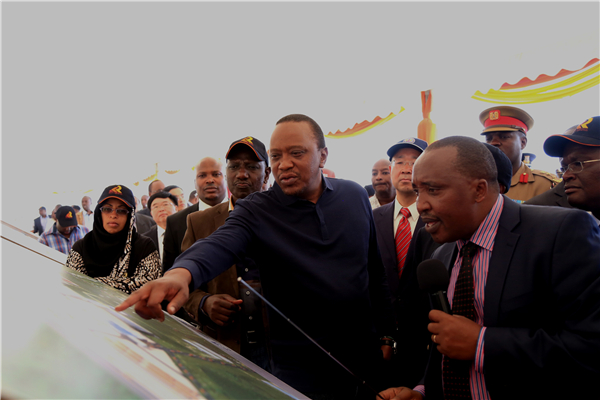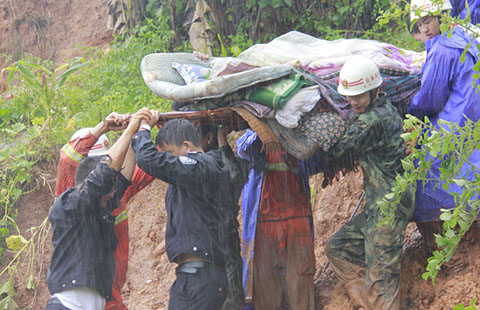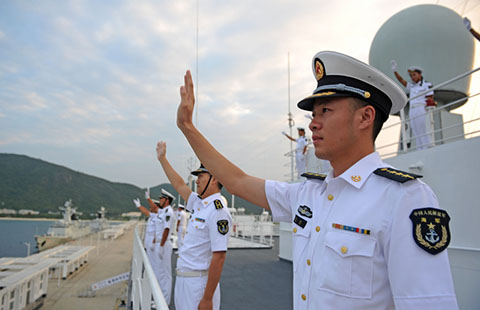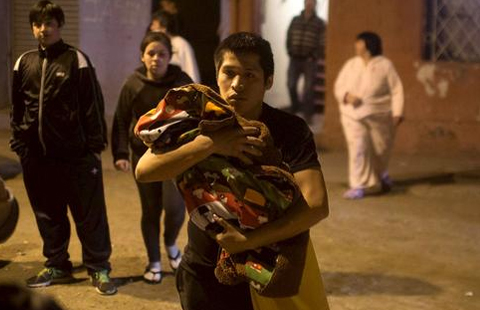
 |
|
Kenya President Uhuru Kenyatta is watching a picture exhibition about Mombasa-Nairobi SGR project before he attended the groundbreaking ceremony of Nairobi South Railway Station of Mombasa-Nairobi SGR project. By Hou Liqiang, China Daily |
The signing of the commercial contract was witnessed by Kenya President Uhuru Kenyatta after he attended the groundbreaking ceremony of Nairobi South Railway Station of Mombasa-Nairobi SGR project. The grandest-ever project after Kenya gained independence in 1963 is under construction by China Road and Bridge Corporation, a subsidiary of China Communications Construction Company.
The President also had a meeting at camp office of the Section No 8 of Mombasa-Nairobi SGR project, where he was briefed the development of the project.
No details about the commercial contract are made public yet.
Naivasha, a lakeside beauty spot famous for its wildlife resources, especially the bird, is about 90 kilometers from Nairobi.
The president also witnessed the signing of a commercial agreement between China and Kenya for The Dongo Kundu Special Economic Zone in Mombasa, but no details are available yet.
Mombasa-Nairobi SGR project has proceeded rapidly with remarkable achievements. According to the company, 98 percent of the land acquisition, 61 percent of the roadbed construction, 50 percent of the bridge construction, and 63 percent of the culverts construction have been finished. The company has planned to start trial track-laying along the whole line late next month.
Nairobi south railway station, close to Jomo Kenyatta International Airport, is about 12 kilometers southeast of Nairobi. With a gross floor area of 21,400 square meters and a building height of 21 meters, the station will become one of the landmark buildings in Nairobi.
Additionally, green ration of Nairobi south station will reach 10%, which could alleviate environment pollution like dust caused from large scale warehouses around and will create a modern, pleasant train station.
Julius Li, CRBC manager for external relations and cooperation for the SGR project, said CRBC has taken all necessary measures to ensure that it delivers a quality project. “Internally, there is three-level quality control system— the first level entails Site Offices to carry out self-examinations, then the Branch Offices inspect and track the works and finally the Head Office evaluates in a timely manner in the quality control and progress,” he said.
“All these processes are subject to scrutiny by CRBC, Kenya Railways as well as the consultant consortium led by the TSDI. No works are constructed at site without consent and approval of the Consultant and the Client,” said Li.
The 472.25-kilometer Mombasa-Nairobi Standard Gauge Railway will cost up to $3.8 billion, and the Import-Export Bank of China is offering 90 percent of the funding. The ambitious project is expected to boost economic growth in Kenya by 1.5 percent.
Up to now, the project has employed 25,000 Kenyans. More than 16,000 employees have been trained since start of their careers in the project and 2700 Kenyans have become qualified lab technicians, surveyors and mechanic workers after training. Moreover, the SGR project has worked with Kenya training institutions to establish training center to train Kenyan employees in terms of railway technology and operations.
“What we are bringing to Kenya is not just the railway hardware but also advanced knowledge and skills that will help in the design, construction and operation of the railway system,” said Li.
CRBC in partnership with Kenya Railways and the TSDI led Consortium are also planning to compile a comprehensive handbook on construction technology and management of SGR. The document will serve as a guideline in the implementation of SGR projects in future.
Aside from employment and training opportunities, local industry is also benefiting from the project. The company has so far signed purchase agreements with 360 local suppliers and subcontracted 40 local subcontractors. It is currently in talks with another 40 local firms for partnerships in different areas.
CRBC attaches great importance to the implementation of local components and actively carry out cooperation with local suppliers and subcontractors. “The principle we adhere to is not to consider sourcing materials, machineries, equipment, services and so on from the international market if they are found available in the Kenya market. We take concrete actions to take in local partners to the maximum extent to participate in construction of the Mombasa–Nairobi SGR so as to stimulate development of associated industries in Kenya,” said Li.
To date, the project has purchased material of Ksh 30.3 billion ($28.8 million) locally, accounting for 30% of the planned total. CRBC said more local suppliers and subcontractors will participate in the project construction as the project continues to achieve win-win cooperation with local firms.








